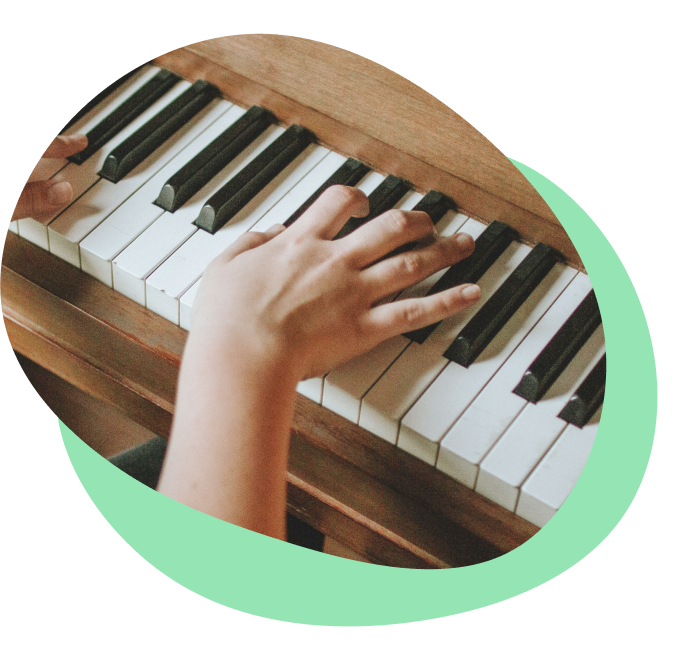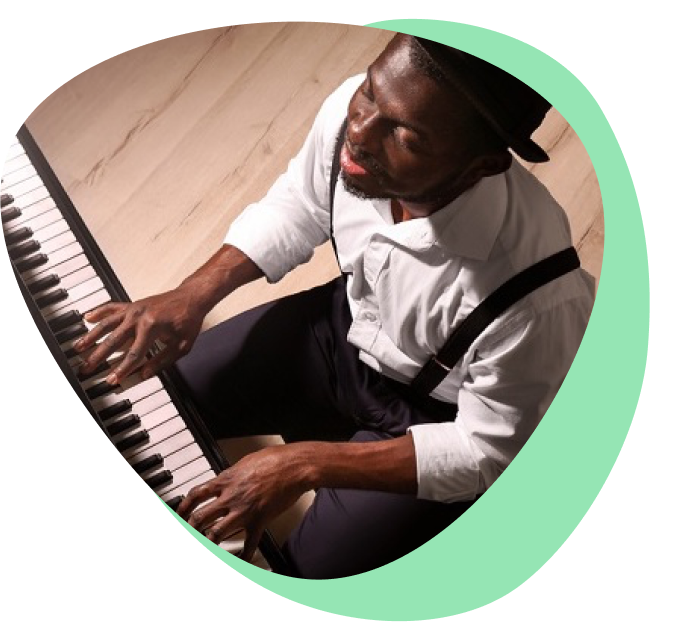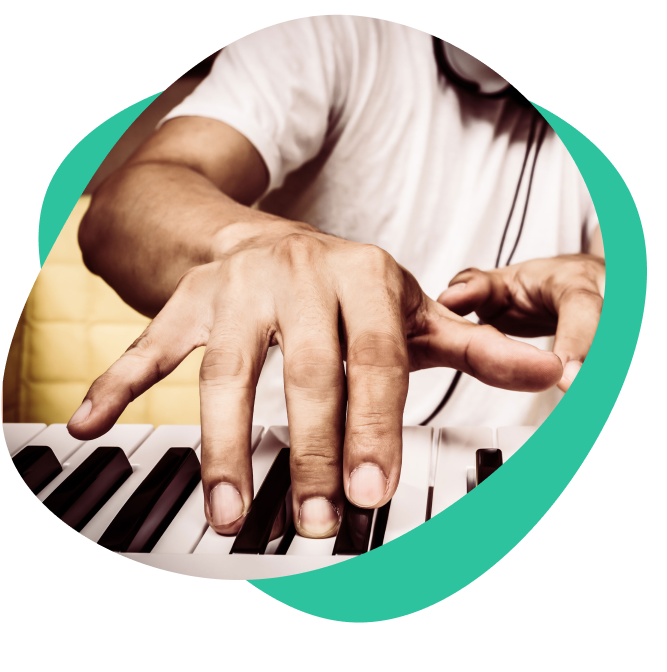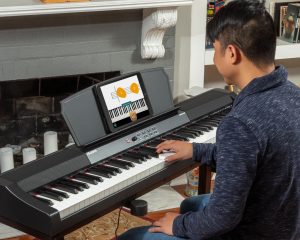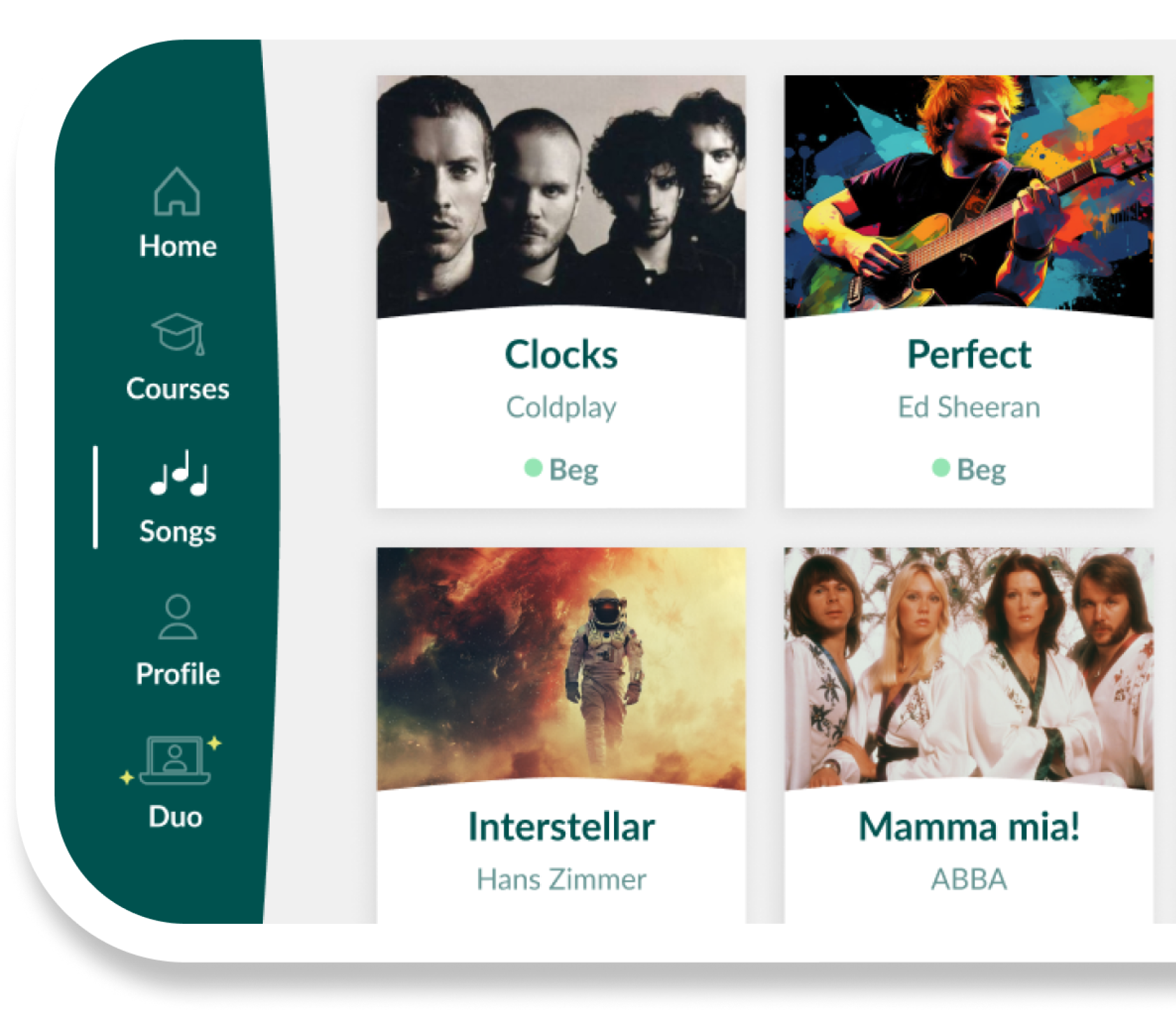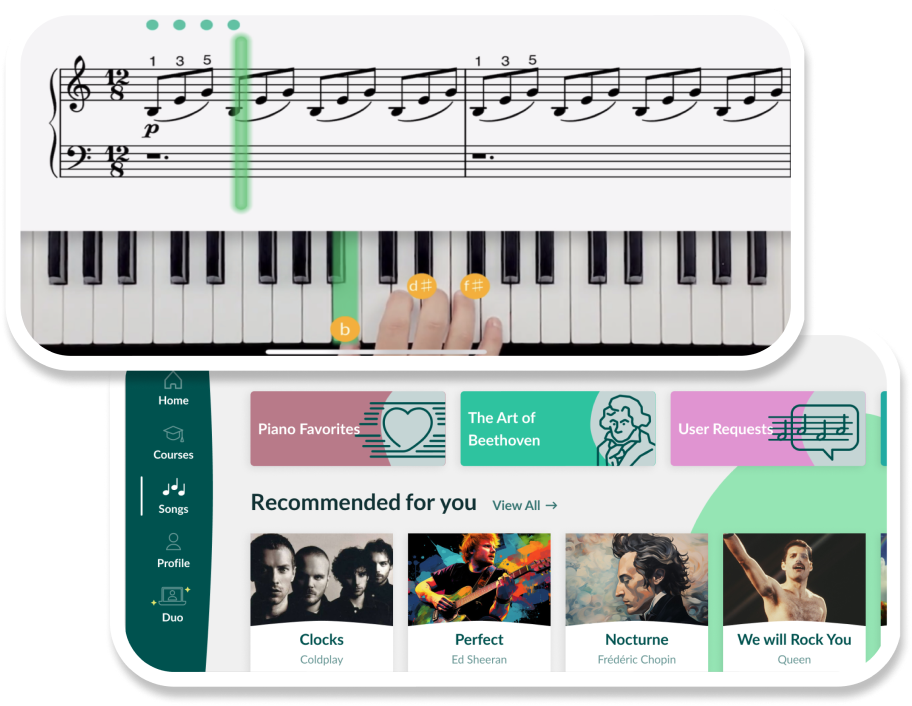Choosing the right piano books for beginners is a very important choice. Ensuring that you have the proper piano book for your learning style and goals will help you build a solid foundation of skills and technique, give you consistent progress, and help you stay engaged and inspired.
In this article, we will explore the ins and outs of beginner piano books. We will take a look at the most popular titles and examine their learning styles and goals so you can choose according to your preferences.
- Fall in love with the music - Learn your favorite songs, at a level suitable for you.
- Enjoy interactive piano lessons - Explore courses covering music theory, technique chords & more.
- Get real-time feedback - Skoove's feedback tells you what went well and what needs practice.
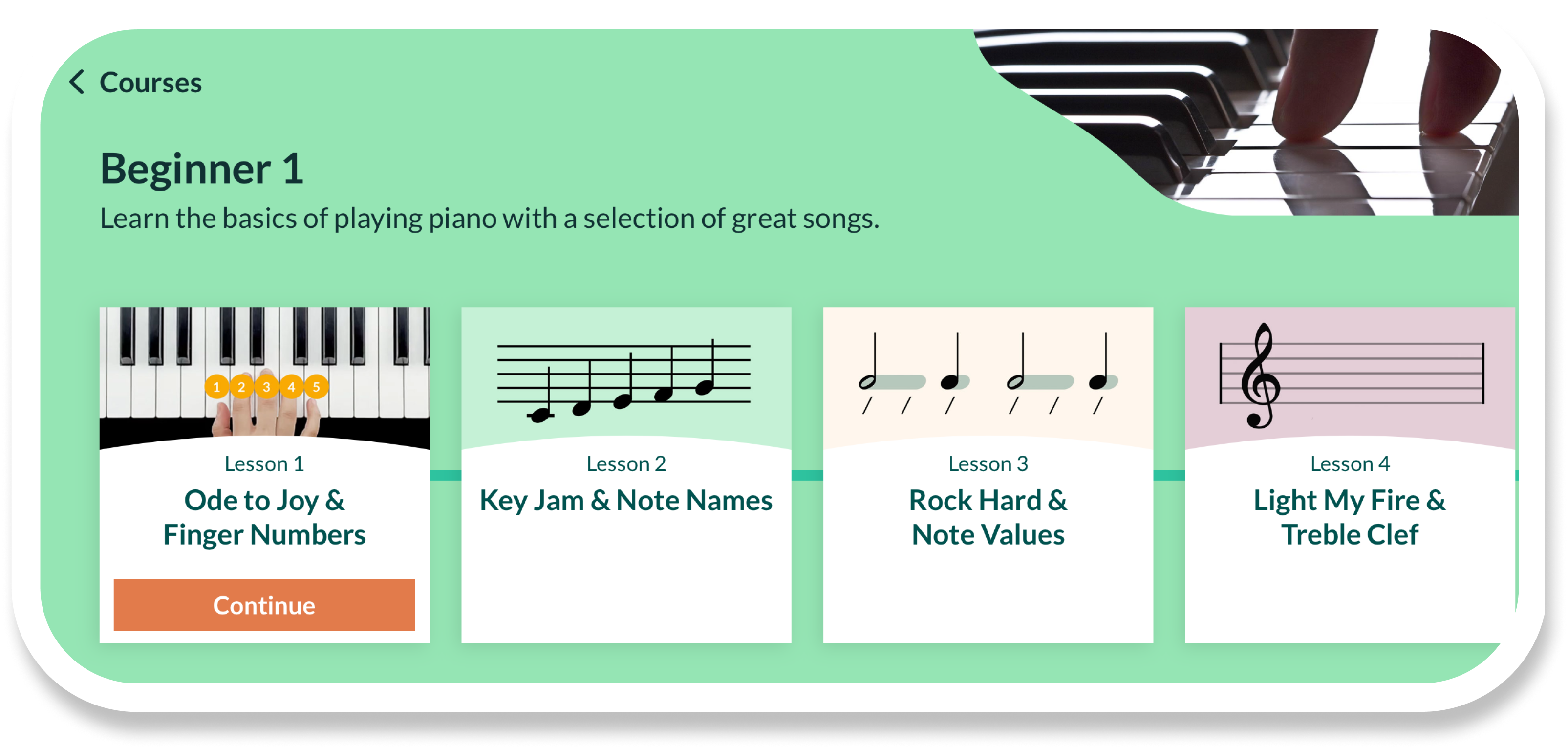
Understanding beginner piano books
At a basic level, beginner piano books are designed to introduce students to the fundamentals of piano playing.
These books outline the basics of piano theory, which typically includes reading notes and rhythms, basic melodies, chords, and scales. These books also help prepare students for more advanced piano studies.
Types of beginner piano books
There are several types of beginner piano books, each serving a different purpose in learning how to play the piano. Let’s take a look at the different varieties of piano books.
| Method books | Method books are comprehensive guides that offer a structured approach to learning the piano. They typically start with the very basics, such as hand positioning and note reading, and progress to more advanced concepts. Popular method book series include Alfred's Basic Piano Library and Faber Piano Adventures. |
| Songbooks | Songbooks are collections of songs arranged for beginner pianists. They are generally themed according to artist or genre and often feature simplified arrangements of popular tunes, allowing beginners to learn and play songs they enjoy. Songbooks are a great way to keep learners motivated and engaged in their practice and learn some of the best songs on the piano. |
| Technique books | As the title suggests, technique books focus specifically on developing the technical skills required for proficient piano playing. These books often contain exercises and drills designed to improve finger strength, dexterity, and coordination. |
Factors to consider when choosing piano books for beginners
Finding the right piano books for beginners is a little more complicated than just picking one up from the local music store. You should spend a little bit of time investigating the different options and compare them to your preferred learning styles and goals. Let’s look at some factors to consider in your search.
Skill level
Assessing the piano book’s beginner skill level is the first step in choosing appropriate piano books. Beginners vary in their prior musical experience and proficiency, so it’s crucial to accurately gauge their abilities.
Assessing the beginner’s skill level
Before selecting a piano book, it’s essential to evaluate the beginner’s current level of proficiency. This can be done through simple assessments such as testing their ability to read music, play basic scales, or perform simple melodies.
Matching the book’s difficulty to the beginner’s level
Once the beginner’s skill level has been assessed, it’s important to choose a piano book that aligns with their abilities. Most piano method books have a grading system, so you can easily choose the grade once you assess skills.
Beginners should start with materials that are neither too easy nor too challenging, as this ensures steady progress and prevents frustration. Look for books labeled specifically for beginners or those graded according to difficulty levels.
Age appropriateness
The age of the beginner plays a significant role in selecting piano books. Materials tailored to different age groups consider developmental stages and cognitive abilities, ensuring an engaging and age-appropriate learning experience.
Books tailored for children vs. adults
Piano books for beginners are often categorized based on age groups, with materials designed specifically for children or adults.
Children’s books may feature colorful illustrations, simplified language, and familiar tunes to capture their attention, while adult books may offer more sophisticated explanations and repertoire suited to mature learners.
Considering the maturity level of the learner
In addition to chronological age, it’s essential to consider the maturity level of the learner. Some beginners, regardless of age, may prefer materials that challenge them intellectually and emotionally, while others may gravitate towards more light-hearted and playful content.
In the video below, Stephanie from Hoffman Academy explains that while there isn’t a standard age to learn piano, there are some key factors to consider, and one of them is the desire to learn. This means that even a six-year-old can understand well, including by following the right books, if they have the motivation.
Musical preferences
Tailoring piano books to the beginner’s musical preferences can enhance motivation and engagement.
Whether the student enjoys classical music, rock or pop, or film music, it is important to choose a book that includes songs and material that the student actually wants to learn. This way, everything will be more fun and enjoyable.
Learning style
Understanding the beginner’s learning style is essential for selecting materials that resonate with their preferred methods of learning and processing information.
Visual learners vs. auditory learners
Beginners may have different preferences when it comes to absorbing information. Some may excel with visual aids such as sheet music and diagrams, while others prefer auditory cues such as recordings and demonstrations.
To optimize their learning experience, choose piano books that accommodate the beginner’s preferred learning style, or investigate online piano lessons.
Books with multimedia supplements
Many modern piano books come with multimedia supplements such as audio recordings, video tutorials, and interactive software. These resources cater to diverse learning styles and provide additional support and reinforcement outside of traditional printed materials.
Goals and objectives
Aligning piano books with the beginner’s goals and objectives ensures their learning journey is purposeful and fulfilling.
Short-term vs. long-term goals
Consider whether the beginner’s goals are short-term, such as learning a specific piece for an upcoming performance, or long-term, such as mastering advanced piano techniques or pursuing formal qualifications. You should avoid catchy titles like “learn piano in 7 days”, as those titles betray the time required to truly learn the piano.
Select books that support their overarching goals while providing opportunities for incremental progress along the way.
Books aligned with specific learning objectives
Different piano books cater to specific learning objectives, such as sight-reading, technique development, or building repertoire.
Identify the beginner’s priorities and select books that address their areas of focus, whether it’s honing technical skills, expanding musical repertoire, or gaining a deeper understanding of music theory. You can always pair these interests with piano learning apps as well.
Review of popular piano books for beginners
Now that we have an overview of some considerations you should make when choosing beginner piano books for yourself or for your students or children, let’s take a brief look at some of the most popular piano methods.
1. Faber: Adult Piano Adventures All-In-One Course Book 1
The Faber Adult Piano book is designed for older beginners. It is a comprehensive introduction to the piano and covers technique, repertoire, and theory. Additionally, it comes with online video and audio supplements.
Faber’s all-in-one approach and the variety of musical styles it covers is a major benefit. However, it is quite detailed and may be best used with a teacher for guidance.
2. Bastien: Piano for Adults – Book 1
Bastien Piano for Adults focuses on interval and chord reading, sight reading, and music history in a medium-paced format. It is a well-loved method, however it may move too quickly if you don’t have any previous piano knowledge.
3. Alfred’s Basic Adult All-in-One Course – Book 1
Afred’s method book is a classic piano book for adult beginners. It covers all the basics including theory, notation, two hand playing, and technique.
Users also highly recommend this book, as shown in this Quora thread, which focuses on the best piano books for beginners.
While it offers a variety of well-known tunes, some users feel it may skip around too quickly and could benefit from additional multimedia resources.
4. John Thompson’s Adult Piano Course – Book 1
The John Thompson Adult Piano Course offers a mix of classical arrangements and originals. It’s updated and re-engraved for clarity. It has mixed reviews; some students love it, while some students think it is best for those with previous piano knowledge.
5. Hal Leonard Student Piano Library: Adult Piano Method – Book 1
This book takes an all-in-one approach, combining lessons, solos, techniques, and theory. It’s well-paced and includes online audio accompaniments. It’s suitable for both self-instruction and use with an instructor, offering a sense of accomplishment for beginners.
6. The Classical Piano Method – Method Book 1
Created by Hans-Günter Heumann, this book is ideal for adults and young people starting or returning to the piano. It introduces well-known classical pieces from the outset and is designed to progress in small, manageable steps. It’s noted for making learning exciting and fun.
7. Piano For Dummies (3rd ed.)
“Piano For Dummies” provides fundamental piano instruction for beginners and those looking to refresh their skills. It includes audio and video online to enhance learning. Some reviews mention it’s great for basics, while others suggest it may be too fast-paced for complete novices.
Each of these piano method books offers a unique approach to piano instruction, catering to the diverse needs and preferences of beginner pianists. Whether you’re an adult learner seeking a comprehensive course with fun and easy piano songs or a classical enthusiast eager to dive into timeless repertoire, there’s a book to suit your musical journey.
Learning piano with Skoove
Skoove offers an innovative way to learn piano online, providing interactive lessons and tutorials that cater to both beginners and advanced players. With Skoove, learners can unlock the magic of piano playing through a comprehensive method that adapts to their progress and gives real-time feedback.
Here’s how Skoove can help:
- Interactive lessons: Skoove’s lessons are designed to be engaging and interactive, making learning piano fun and effective.
- Personalized feedback: Using AI technology, Skoove listens to your playing and provides personal feedback, helping you improve with each session.
- Extensive course library: With over 500 lessons and courses, Skoove offers a wide range of topics, from music theory to technique, all broken down into bite-sized chunks for easy learning.
- Play your favorite songs: Whether you’re into pop hits or classical favorites, Skoove allows you to learn and play the songs you love.
- Multimedia supplements: The platform includes audio and video aids to enhance the learning experience, perfect for auditory and visual learners.
Choosing the proper beginner piano book for you
Choosing the proper piano books for beginners is an important foundation for every student. Whether you prefer structured learning method books like the Faber or Alfred methods or choose to embrace modern tools like Skoove in favor of traditional book learning, picking a method that aligns with your learning style and goals is paramount.
While all method books offer something worthwhile for the student, only Skoove offers such a wide blend of classic and contemporary repertoire to choose from, with real-time feedback on your playing. Take a look and see how Skoove can help you reach your piano goals in no time!
Author of this blog post:
Susana Pérez Posada

With over seven years of piano education and a deep passion for music therapy, Susana brings a unique blend of expertise to Skoove. A graduate in Music Therapy from SRH Hochschule Heidelberg and an experienced classical pianist from Universidad EAFIT, she infuses her teaching with a holistic approach that transcends traditional piano lessons. Susana’s writings for Skoove combine her rich musical knowledge with engaging storytelling, enriching the learning experience for pianists of all levels. Away from the piano, she loves exploring new places and immersing herself in a good book, believing these diverse experiences enhance her creative teaching style.
Published by Lydia Hovan from the Skoove team




